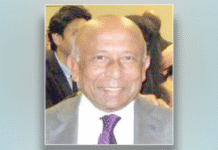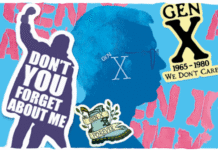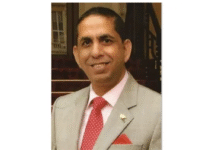
By Prof. M. Adil Khan, Australia
While Shahbagis have successfully reminded us of the liberationist ideology and also the hurt of 1971 many also believe that in its wake the movement may have also left legacies that the nation must assess carefully and tackle maturely in the coming days.
In many ways, Shahbag has been a strange movement in the sense that contrary to the known tradition Shahbag movement might have been the only movement in the world where youth and a section of the civil society gathered together to agitate against opposition. Most civil movements mobilize to protest wrong-doings of an incumbent government and demand accountability.
Indeed, if one is to go by the record of wrong-doings of current government, the list is quite long – corruption, failing law and order, falling human rights standards etc. etc. and yet Shahbagi protesters had little or no zest for protesting against any of these acts of misdeeds. Instead they chose to demand (some believe and with some justification, that they have been stage-managed or at least co-opted from behind-the-scene by the government to do so), the death penalty for the under trial suspected war criminals most of whom belong to the opposition Jamat and BNP, that provided the government the casus belli for further marginalization if not elimination of their political opponents.
Without due regard to the fact that by demanding death penalty for under trial war criminals these guys were not only tempering with the independence of the justice system but also were trashing the very liberation ideology for which they claimed they were fighting for – justice and fairness.
What is also sad for the nation is that apart from legal misdemeanour that Shahbag displayed they in their hateful manner of agitation night have portrayed an image of Bangladesh that is hardly flattering. At the height of the Shahbag rally, little toddlers with bandana on their forehead crying death were a spectacle that Bangladesh rather not have and be proud of. An expatriate colleague who personally visited Shahbag during its peaks and followed the newspaper/TV reporting and the statements of a section of the civil society that demanded death to suspected offenders of 1971, observed that “Bangladesh must be the only country in the world where people held candle light vigils baying for blood” and that “it must also be the only country in the world where the left-leaning intellectuals, the secular-liberationist (“Secu-lib”) academics and activists, and human rights defenders advocate collectively for death penalty and demand judicial processes to proceed selectively.” This is not an image that you would wish to project to the outside world. Thanks to the Shahbagis, we did just that.
No one dispute that suspected war criminals must be tried and punished but everyone expects that the trial they face be fair and transparent. But the demands of Shahbagis and subsequent actions by the government that indicate that death penalty is almost a fait accompli for most under trial suspects have done little to raise the confidence in the justice system of Bangladesh. Shahbag induced action of the government that has allowed the provision of retrial for the non-death sentences, may have dealt further blow to what is already a very controversial tribunal, promoting in the wake a notion that we as a nation subscribe to the idea of lynch mob justice to address our political differences.
In reference to the war tribunal’s current compromised state, death sentencing and the ensuing violence and counter-violence that gripped the nation, Ms. Shelina Zara Janmohamed, a columnist of Al-Jazeera had observed that “The past victims of the war are still far from justice and the number of those who are victims of injustice as a result of the ongoing conflict is also rapidly growing.”
Shabagis also demanded that Jamat, the Islamist right wing party be banned as a political party. While most agree that given their horrific record of collaboration with the marauding Pakistani junta in 1971 and given that they are yet to apologise for their war time wrong-doings and also that many of its collaborating leaders continue to lead the party even today, it is natural that people would question Jamat’s legitimacy especially its moral right to engage in independent Bangladesh’s political governance. Having said this one must not also forget that Jamat is a legal political entity and therefore, irrespective of its bleak past it has every legal right to participate in the full spectrum of political processes of the country. While their moral right is questionable their legal right is unalienable and we must also appreciate that moral lapse in one context does not automatically justify sanction in another. Furthermore, in a properly functioning democracy the way to oppose a group is not through outright banning of that group but through expression of choice through unintimidated voting. In India, a secular democratic country, where religiously oriented or religious parties such as Bharat Janata Party, Jamat Islami Hind etc. function legitimate political entities that regularly participate in the electoral processes of the country.
Another dangerous legacy of Shahbag is that they quite vociferously have spawned a debate concerning our national identity – are we Islamic or are we secular? It is somewhat of a tragedy that this debate is raging after 40 years of our independence and sad that it is also dividing the nation right in the middle.
Shrewdly manipulated by the politicians this sharp and sometime acrimonious ideological divide that exists between the so-called Secular/liberationists (Secu-libs) led by the ruling Awami League and the Islamist/Nationalists led by the BNP/Jamat has already costed the nation dearly and reveals that as a nation we are yet to come to terms with our identity – to be or not to be seems to be the question.
Furthermore, in recent times in their efforts to marginalize Jamat several bloggers failed to make the distinction between Jamat Islami as an Islamic religious political party and Islam as a religion. They spread anti-Islam hate postings in their blogs, complicating the discourse on our national identity even more.
Initially government remained somewhat indifferent to these anti-Islamic tirades thinking that they could extract some political gains out of these. But it backfired. Ordinary god fearing Bangladeshis got the notion that this government is not merely against Jamat/BNP (the Islamist/Nationalist protagonists) but against Islam itself. Their suspicions got further entrenched when they saw that in pursuit of agitating Jamat police entered mosques in several places and killed praying Muslims. It is true that the government has since realized its mistakes and is trying its best to retract its position by arresting some of the anti-Islamic bloggers, but things may have gone little too far to improve credibility.
Now coming back to the debate concerning our national identity that has since been a source of many acrimonious exchanges if not bloody conflicts we must ask how relevant this debate is for we must know that national identity can or should never be defined from the top. Pakistanis tried this on us and we know the result. National identity evolves and takes shape from within over a long period of time where among other factors religion, all religion and in case of Bangladesh where 90% of its population are Muslims, Islam, not the Wahhabi fundamentalist Islam but the moderate inclusive Islam, is bound to play an important role and thus is likely define, direct and shape our social and cultural identity, indeed, within the parameters of secularism.
Romila Tharpar suggests that there is no contradiction between secular governance and religion, the challenge for a secular society is to keep social concerns excluded from divine interventions – she argues, “Policies relating to the entitlements of the citizen – social welfare, education, health, distributive and social justice and the rule of law can be, and should be, the constituents and primary concerns of a secular society. However, these have to be integrated as a process of governance, since they can also be abused by those in power. Ensuring the just practice of law becomes a necessity. These are aspects of the secularizing of society”.
Therefore, what is needed by the nation of Bangladesh is an ideology that respects all religions as well as ethnicities as equals and embeds in its governance structures principles of human rights and pursues these principles with utmost and fare application of rule of law. This is the path that we must follow. The moment we deviate or let vested interest take control we invite conflict and cause disunity among us.
Finally, if there is one thing that the Shabagis ought to be credited with in their movement, it would be the revelation that that we as a nation has remained largely stooges of or passive onlooker to the predatory activities of our feuding and self-seeking political leaderships those that have brought the country to the abyss of doom that we all have fallen into now. Over the years we have allowed them to distort our history, loot and plunder our treasury, indulge in blood-soaked political bickering and degrade our moral tapestry. Instead of demanding accountability, a normal practice in any democracy we have allowed our leaders to manipulate us and let us prostitute our intellect to legitimize their evil deeds.
All of these have culminated into the worst form of political militancy and cruellest of police violence that this country has ever witnessed where bloodletting has become an order of the day. In our deep divisions we no more see human beings as human beings – we see ourselves as AL, BNP, Jamat, whatever. Harm to one becomes a source of joy for the other.
Change, a wholesale change is what we need. We must change from what we have been turned into. We must change the way we think, behave and interact. We must reject things that have shattered us, degraded us and diminished us.
Leadership for change thus must come from us, the citizens and not from the politicians. It is upto us to change the politicians as Barack Obama reminds us, “Speaking as a politician, I can promise you this: political leaders will not take risks if the people do not demand that they do. You must create the change that you want to see.”
And this is precisely what the people of Bangladesh had done in the past. They forced change when it was needed most desperately.
History reveals that every time politicians especially their leaderships faltered or were slow to act to advance an agenda of collective good, it is the young – not the very divisive and partisan Shahbagi types – but those that took upon themselves apolitically, the mantle and pushed for change inclusively, selflessly and indeed, decisively, with success.
In 1970 it is the 11 point agenda (“Egaro Dofa”) of the Dhaka University Students’ Union (DACSU) that set the tone for change that ultimately culminated into creation of independent Bangladesh and again in 1990 it is the All Party Student Action Committee’s initiative that brought the feuding parties and their leaders under one platform to fight dictatorship and establish democracy in the country.
Time may have come now for the youth to bury their differences, mobilize and fight to recreate a Bangladesh that we fought and aspired for but lost, a Bangladesh that is truly democratic, corruption-free, accountable, just, inclusive and vibrant and most importantly, a Bangladesh that is decent.
Young have done it the before, they can do it again.










Professor Khan raised an important issue regarding the question of our national identity. I believe that our national identity could not be defined by the politicians, but must emerge over time from within the people. I also believe that our leadership during and after the liberation of Bangladesh could have guided the nation in the process of defining the national identity, which they utterly failed. So the hope lies with the young generation to help shape the destiny of a nation torn by partisan politics. Professor khan cited an example of the university students who helped guide the politicians in the past. I too believe that the students and all other progressive groups of people can help the country come out of the crisis we are in. Of course, ‘Shahbag moncho’ is not a good example for that matter.
Cannot agree more with Prof Khan. His analysis and comments have hit the nail on the head. This is very unfortunate that our young generation is playing in the hands of those politicians who have everything except patriotism. The damage done by Shahbagh movement to the Nation in general and to the young generation in particular is huge. In the name of progressiveness our politicians and so called ‘intellectuals’ and opportunistic media influenced by Western and neighboring culture promoted hatred and resentment against Islam and practicing Muslims. This in effect gave rise to conflicting identity issues and as a result the Nation is divided right in the middle now. The notion of the AL (since liberation) and their ally media and intellectuals that whoever oppose them is anti-liberation or rajakar started the divide and then the notion was extended to include anybody with beard and cap or offering their prayer five times a day in the anti-liberation category. Our young generation didn’t have an opportunity to know the proper history of emergence of Bangladesh as nobody bothered to compile the correct history. One big mistake on AL’s part is that they thought whoever fought for the liberation or basically the Nation as a whole gave away their religious identity when they separated out from Pakistan. If you look at the history of AL politics post 1971, this is crystal clear.
The assumed identity crisis is in fact not ‘real’ and a creation of the govt to cover up their evil deeds. Remember what the ‘Father of the Nation’ said before going to attend the OIC held in Lahore? He said he was a Muslim and he was a Bangalee. But his daughter derailed and encircled by the fallen left is now miles away from her father’s ideals. Being one of the most powerful leaders of the world, he never demeaned or ridiculed none of his antagonists such as his overweening daughter has been doing now unhesitatingly. Again, if we do not go in line with Sharatchandra Chatterjee, Bangalee and Muslim can be the same thing alright as Bangalee and Hindu/Christian/Buddhist can be. All our celebrated leaders like Suhrawardy, Sher-e-Bangla, Moulana Bhasani, Bangabandhu – weren’t they all Muslims? So why has an artificial difference between being a Muslim and Bangalee been erected? The respected writer has very rightly pin-pointed the real intention of the govt behind projecting the ‘Shahbagh Mancha’ up and patronizing it by all available means. And it’s certainly to cover up their diabolical deeds of rampant corruption, money laundering, plundering and grabbing of public property, breaking election pledges, telling brazen lies and what not? And it seems they have been successful even if partially. Very few now talk about the Padma Bridge, the quick rental power plant, the share market scams, the Hallmark, Destiny, Unipay2’s defrauding NCBs and the common gullible people, the shameless tenderbazi etc by the ruling party activists and their henchmen. But there’s limit to everything. And let’s see how the end comes.
I am a university student & It’s ridiculous to see all my friends abandoning their schoolwork to participate in this so-called call of duty to the nation. I completely agree with the gravity of taking toddlers to a hot-bed of trouble for the sake of patriotism. for the youth, it seems to be the in-thing to wear morbid bandannas, eat free tehari and kill time. what I am sure of – my peers don’t know what they’re getting into. None of them will be around to be”give blood for the nation” (as they say rhetorically in bangla) if there is a drone strike at the famous circle. they are around as long as it’s a fad.
I am in agreement with you Dr. Khan. While it is always intense to watch people from many aspects of life stand together, the matter they argue for is not presenting our country in a good light. For children who have lost family members to the war, this matter brings up painful matters.